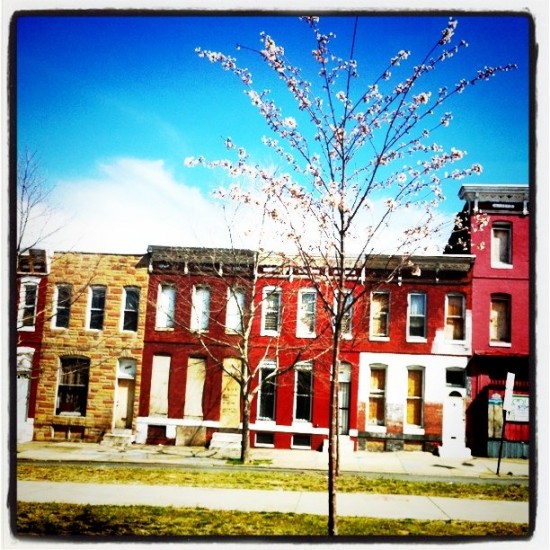
Her school looks out over a giant park – the largest unbroken swath of green in the entire city. When I think of it, it’s as a vital, still living organ surrounded by collapsing, dead tissue – the seeping decay of thousands upon thousands of derelict row houses spreading out around it like a cancer. The city, life-in-death.
I hold her hand as we weave through tight knots of kids clustered together on the sidewalk in front of the school – sixth and seventh graders, steely-eyed with sharp tongues, bused in from all parts of the city. I hear the words they spit – “motherfuckers” and “cocksuckers” and “cunts” – and my blood chills. I want to pick my daughter up in my arms and pad her ears with the palms of my hands, wrap her entire body in something soft but impenetrable, something that would protect her from children whose hard lives put those words on their lips. But I can’t, and I know there’s no such thing that could protect her. Those children are everywhere.
One by one they slide into the desk in front of me and read aloud the same simple, storybook passage from a text her teacher provided. Some of the children have stains on their clothes, bits of food in their hair, dark, indefinable smears on their cheeks. One girl stumbles over every word, struggling to wrap her mouth around what is clearly a foreign tongue to her, blushing hard with each correction I offer. Eventually I have to stop and tell the teacher that the girl simply can’t read at all. Somehow, I feel implicated in this confession. Somehow, the guilt of this admission is mine to bear as well.
Later I sit in the classroom and listen as the teacher tells the children about the people who came to this country before it was a country, about immigrants who sought freedom from bigotry and persecution. It’s a story about the persistence of hope in the face of great adversity – a distinctly American sort of fairy tale. As she speaks of the phantom Pilgrims’ struggle and their longing for the possibility and promise of a better life, I see the children’s eyes brighten with faith in this fair and just world – one where the virtuous always overcome by strength of their virtue, where the unjust always suffer misery for their injustices – and feel my face flush red with shame for the truth I know.
Ah, yes. The dreams that are lies. An impossibly hard truth.
Sublime, Tracey. A punch to the gut. If only the fairy tale could be true.
This is so, so beautifully written. Not everyone gets a happy-ending story but how do you teach that to kids?
Sigh, sad story, beautifully told…I get them in college, when they’re starting to or already haven’t figured out that that’s not always true. I hate the stories I hear every day. A lot of times they rise above though, and that’s my favorite.
(Duh, “have” figured out. I write good.)
Your opening is there at the end too. For some, gathered around those words like the houses around the park, the stories will end in broken windows, yards overrun with weed, the costs of repair to great to bear. For others, clinging to of the edges of the green, there will be growth and renewal, hope will grow up despite the rot.
I think the picture, though difficult, is really very beautiful.